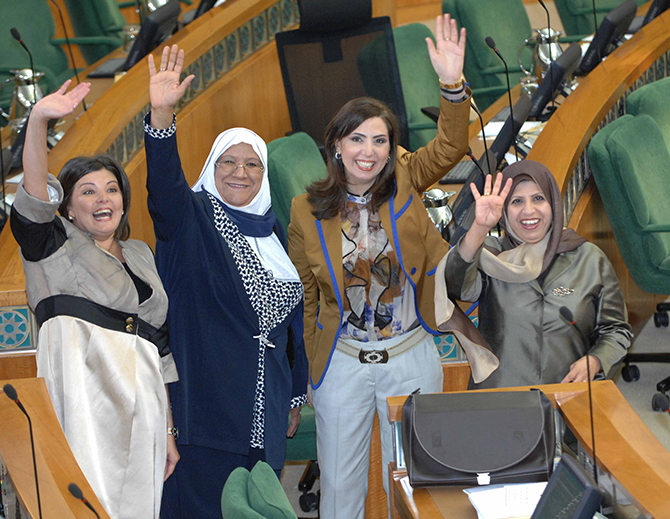by Zeynep Kaya

Kuwaiti elected female Members of Parliament Rola Dashti (2R), Massouma al-Mubarak (2L), Aseel al-Awadi (L) and Salwa Al Jassar (R) during the reopening of Kuwait National Assembly in Kuwait, on Sunday 31 May 2009. Source: Kuwait-Ra’ed Qutena, Flickr
Important changes have been achieved and suffrage has made an impact on women’s political roles in Kuwait, but government support is needed to sustain the changes and overcome existing challenges.
Even though women’s suffrage has not resulted in high levels of women’s electoral participation in Kuwait, women voting and running in elections have impacted and transformed the public perception of women’s roles in electoral politics compared to the early years of suffrage. This has mainly been thanks to the important efforts of women’s rights activists and civil society organisations as well as women who have actively participated in formal politics. However, this work needs consistent, deliberate and constructive support from the government. This is necessary to overcome numerous existing obstacles and challenges.
Since the introduction of women’s suffrage in 2005, the number of women elected to parliament has been very small. Only ten women have been members of parliament (MPs) since then, and none were elected in the 2020 election leading to an all-male parliament today. Interviews conducted for a recently completed research project based at LSE revealed that deeply gendered structural inequalities play a significant role in preventing women’s election in Kuwait’s highly debated one-vote system. They create impediments to women carrying out election campaigns such as inhibiting securing funds, making it difficult to access political spaces and build networks. Women running for office are exposed to sexist prejudices, criticism and public defamation, adding additional difficulties and stress to their political experience.
On the other hand, the fact that only a small number of women have been elected since 2005 does not mean that women do not participate in politics. A record number of women ran as parliamentary candidates in the most recent elections. Increasing numbers of women hold unelected positions in the government. Activism for women’s legal, political and socio-economic rights and women’s participation in unions and political associations should also be considered as political participation in its informal form. Women’s rights activists are pushing to change the gendered discourse around women’s participation and are tirelessly carrying out work through platforms such as Mudhawi’s List to support women in politics.
Crucially, however, the fact that not many women have been elected to parliament does not mean that efforts to increase women’s political participation have failed and not made any impact. On the contrary, these developments have changed the discourse around women’s political and public roles. The new dimensions added to the traditionally men-only institution of diwaniya (places unique to Kuwait where people get together, present views, broker deals, promote candidates and discuss politics) are indicators of this. For instance, female candidates and voters now have access to diwaniyas (at least during election periods) and some female politicians (Ghadeer Aseeri) run their own diwaniyas, which are open to both women and men. The notion of a woman parliamentarian is now more accepted, but maybe less so in more conservative and tribal sections of Kuwaiti society. The younger generation of women are more aware of their rights which could be a result of increased youth activism in Kuwait in general, the internet and social media and also fifteen years of political enfranchisement for women.
As a result of women being elected to parliament, the political discourse has also slightly shifted as women politicians brought up issues that were not discussed extensively in parliament before. For instance, the Kuwaiti Parliament cannot now talk about the issue of housing without referring to non-married, divorced and widowed women. On the government side, it is only women ministers who have agreed to be grilled and put to a confidence vote. Those interviewed for the aforementioned LSE research said that male ministers usually give in or resign before receiving a grilling.
Women’s suffrage has led to a change in the gendered structure of the whole election process. Male candidates and politicians now not only take women more seriously but also talk about women’s issues and what interests them. Of course, their campaign promises do not usually turn into legislation after being elected, largely because of a lack of support for such initiatives among male MPs. Still, male politicians now set up election tents for women and establish women’s committees. Even religious candidates have incorporated women’s issues into their agendas because women are voting for them.
Finally, there are changes in the conservative religious and tribal discourse around women. After suffrage, some of the conservative groups stopped considering women’s political leadership as haram or not acceptable. Women’s visibility in politics (for instance now conservative MPs have to sit and work with female MPs and unelected female politicians) has contributed to the softening of taboos and customs related to gender segregation. The academic discourse has also changed after women’s suffrage, which can be observed in academic curricula that place increasing emphasis on gender and feminist studies and the formation of research centres focusing on the study of gender and women.
However, women’s suffrage and women’s participation in electoral politics has also revealed underlying gendered inequalities and biases in the Kuwaiti system as the report from LSE elaborated on. As stated by one of the interviewees, ‘Women’s voting rights brought out a lot of hateful misogyny to the open and showed that gendered inequalities persist.’ Indeed, the process has shown that suffrage does not easily alter existing inequalities and that it is still very hard for women to get elected to parliament.
Therefore, it is very important that the Kuwaiti government provides direct and stronger support for women’s political participation to sustain the achievements and positive changes observed. More importantly, the government should increase its awareness of the existing barriers and challenges to women’s political participation and exert more effort and allocate more resources to overcome them. This is necessary to change misogynistic and negatively gendered rhetoric and to transform the political space to strengthen women’s participation in both formal and informal political processes.






1 Comments